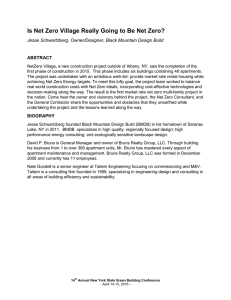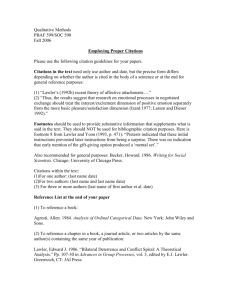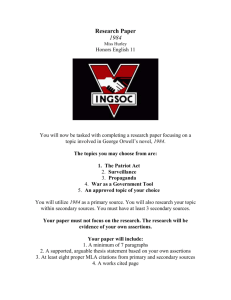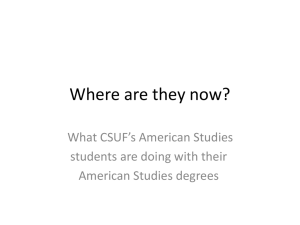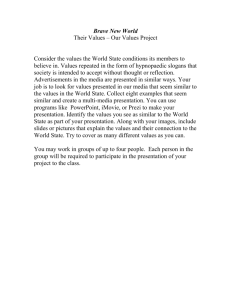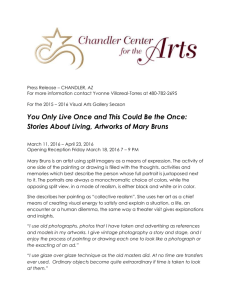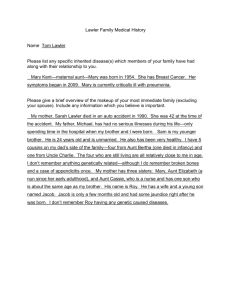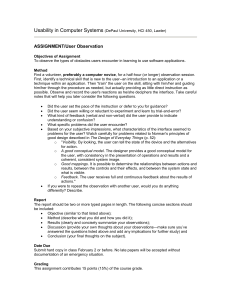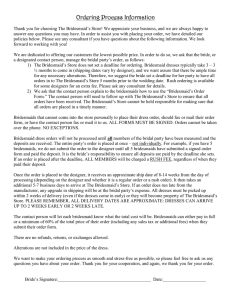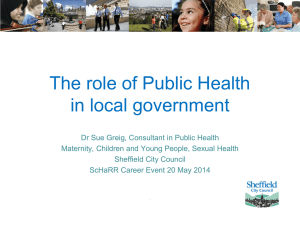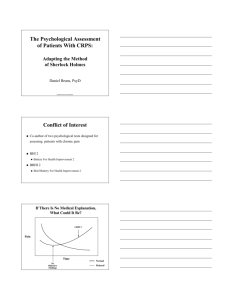Amanda Lawler and Taylor Bruns
advertisement
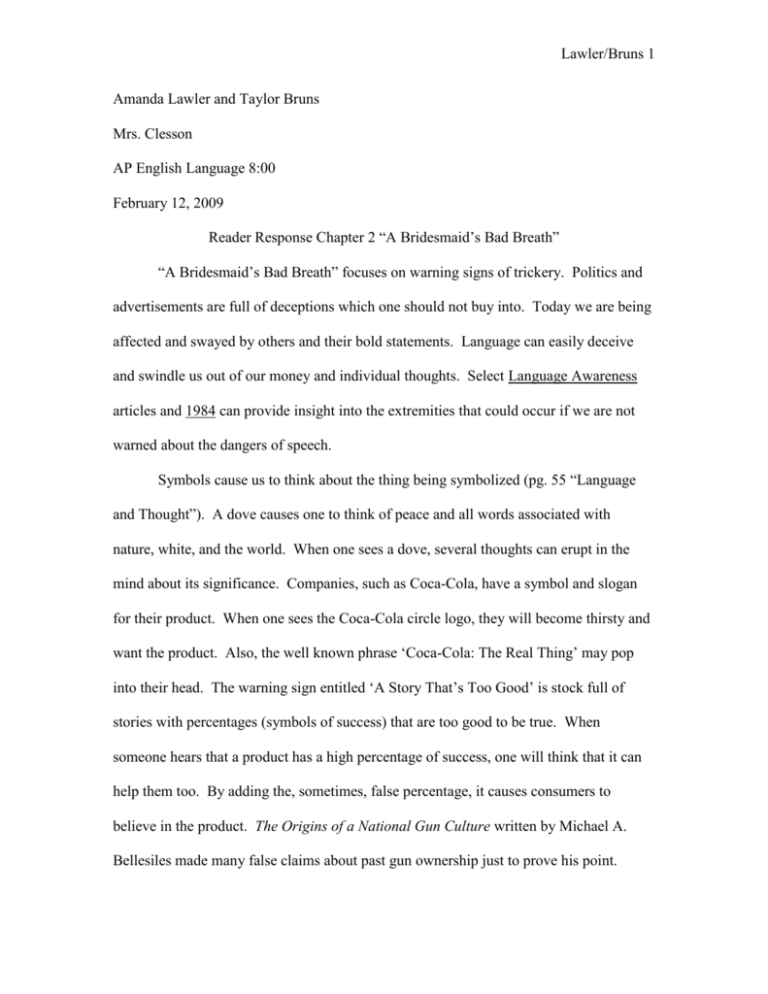
Lawler/Bruns 1 Amanda Lawler and Taylor Bruns Mrs. Clesson AP English Language 8:00 February 12, 2009 Reader Response Chapter 2 “A Bridesmaid’s Bad Breath” “A Bridesmaid’s Bad Breath” focuses on warning signs of trickery. Politics and advertisements are full of deceptions which one should not buy into. Today we are being affected and swayed by others and their bold statements. Language can easily deceive and swindle us out of our money and individual thoughts. Select Language Awareness articles and 1984 can provide insight into the extremities that could occur if we are not warned about the dangers of speech. Symbols cause us to think about the thing being symbolized (pg. 55 “Language and Thought”). A dove causes one to think of peace and all words associated with nature, white, and the world. When one sees a dove, several thoughts can erupt in the mind about its significance. Companies, such as Coca-Cola, have a symbol and slogan for their product. When one sees the Coca-Cola circle logo, they will become thirsty and want the product. Also, the well known phrase ‘Coca-Cola: The Real Thing’ may pop into their head. The warning sign entitled ‘A Story That’s Too Good’ is stock full of stories with percentages (symbols of success) that are too good to be true. When someone hears that a product has a high percentage of success, one will think that it can help them too. By adding the, sometimes, false percentage, it causes consumers to believe in the product. The Origins of a National Gun Culture written by Michael A. Bellesiles made many false claims about past gun ownership just to prove his point. Lawler/Bruns 2 Bellesiles falsified numbers, statistics, and percentages, and claimed a ten year study on the material to sound more credible. These perfect symbols struck readers, but in the end, all of these claims were false. Advertisements promising unbelievable products are usually not believable. According to William Lutz, author of “Weasel Words: The Art of Saying Nothing at All” unfinished words are common in advertisements to give consumers the impression that their product lasts longer or is stronger. In an advertisement for Duracell batteries, the speaker announced that the battery can last up to twice as long. Unfortunately, the consumer believes it as a better product than the others because it can last up to twice as long, but the advertisement never states what this battery is compared to. “The Superlatives Swindle” and “The Dangling Comparative” are other ways to express and use unfinished words to sway one’s listeners. Politicians have a huge influence on the way we live our lives. They create and edit laws, as well as take money from us. In a reelection speech given by President Bush in 2003, he stated that John Kerry had voted for tax increases in the past and would raise taxes higher if he were to be elected. Unfortunately, these claims were made by going through wormholes and twisting the truth. By using a dangling comparative in the claim and stating a bad thing about his opponent, he promoted himself for president. In “Politics and the English Language” by George Orwell, President Bush used a lot of words to get around the truth. He was not concise or direct, which helped him to win the election. If the bridesmaid was aware of her bad breath, she would be able to pop in a mint. Like the bridesmaid, as voters we should actively listen to what is really being Lawler/Bruns 3 said. We should investigate the meanings behind the words given, and figure where the information is gotten from. Speech laws and codes could act to prevent many of these swindles and verbal high jinks used by politicians. Because speech codes cause a disadvantage to the majority of society, however, they are not going to be reinforced or have support. In 1984, speech codes were taken to the extreme and reinforced to the point where they abolished individual thought and words. Like in 1984, if speech codes were set in place, politicians may have trouble talking around topics and may not be able to use glittering generalities. 1984’s suppressed language is very much transferred to politics. Unfortunately, many people don’t think for themselves because others will for them. When a government official believes in gay marriage and abortion and you decide to vote for them, you have accepted all of their values. In essence, you have paralleled your thoughts to theirs. 1984 only has one politician, Big Brother. Therefore, in the book everyone’s views were parallel to Big Brother’s because he held the power. President Barack Obama is a confident leader and is ready for change. However, because of his quick slogans and the commonly used “Yes we can!” many U.S. citizens jumped on the bandwagon and were not aware what political views they were reflecting. All the warning signs of trickery are used by politicians and in advertisements. Having the knowledge to watch out for such shams can help any person to buy wisely and listen closely to what others say. Being aware of one’s bad breath is a problem that can be cleared up with a mintflavored tic tac. Unfortunately, deceitful language used in advertisements and politics Lawler/Bruns 4 can be harder to diagnose and can easily brainwash the recipients. Watching out for glittering generalities, dangling comparatives, superlative swindles, things too good to be true, etc. can help one to think freely and form their own opinions about a product or political issue.
